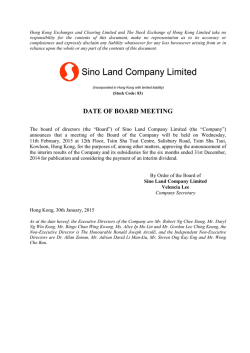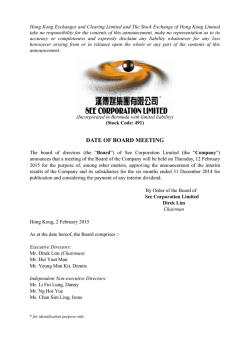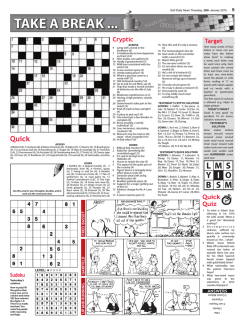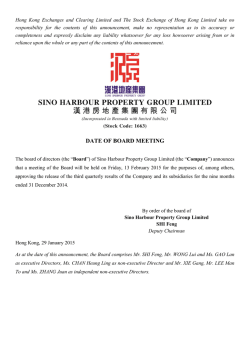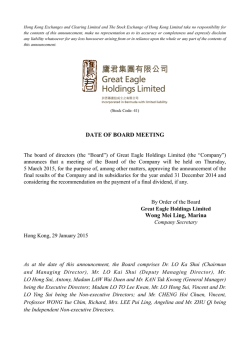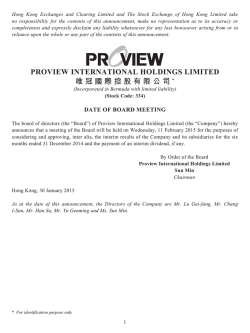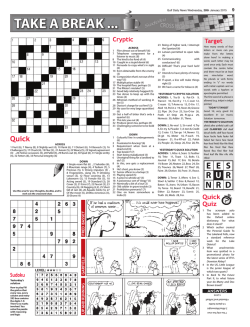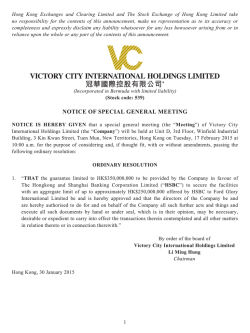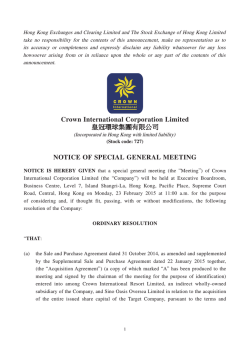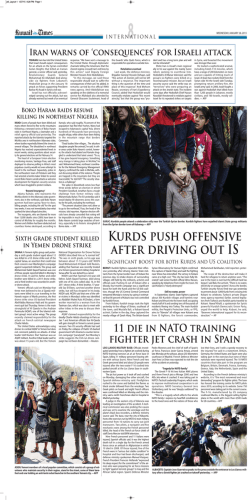
p12_Layout 1 - Kuwait Times
MONDAY, FEBRUARY 2, 2015 I N T E R N AT I O N A L Philippine minister not told in advance of raid MANILA: The Philippine interior minister said yesterday he did not know in advance of plans for an anti-terror raid that triggered a bloodbath in which 44 police commandos were killed. Manuel Roxas, who is in charge of the national police, said he had no foreknowledge of the January 25 operation. The huge losses shocked and enraged the nation and imperiled a peace pact with the main Muslim rebel group in the southern island of Mindanao. “They did not tell me about this... I’m not saying I would have known better but I also can’t help feeling I was not given a chance to ensure there was better coordination,” he told demoralized members of the police Special Action Force (SAF) at their headquarters. The SAF commandos were gunned down while on a mission to capture or kill Malaysian bomb maker Zulkifli Bin Hir, alias Marwan, a leading member of the Jemaah Islamiyah group which staged the 2002 Bali bombings in Indonesia. While authorities say Marwan was killed, the commandos were later ambushed by Muslim armed groups-including fighters of the Moro Islamic Liberation Front (MILF) which signed a peace agreement with the government last March. The MILF said the raid should have been coordinated with them under the terms of the ceasefire. “Your job is tough and dangerous. It is the duty of the state to give you the full support, equipment and training and not to send you into hopeless operations,” an apologetic Roxas said in a dialogue at SAF headquarters. However the minister, a close confidante of President Benigno Aquino, told the commandos to await the result of an investigation before jumping to conclusions. Aquino had previously said he was informed by top police of the operation. “We again appeal to everyone to give peace a chance,” his spokesman Herminio Coloma said in a radio address. “Let us unite under this principle while seeking justice and accountability over what happened... last week.” Coloma said a final peace agreement would require the 12,000-strong MILF to disarm in exchange for control over an autonomous region in Mindanao. But public anger threatens to derail efforts to pass legislation needed to implement the peace accord before Aquino steps down in 2016. The main gate of national police headquarters in suburban Manila has become an unofficial memorial bedecked with flowers, candles and other tokens left by mourners. About 200 military veterans and serving soldiers drove up on motorcycles yesterday, offering prayers and lighting candles. — AFP Japan mourns Kenji as a courageous reporter News of beheading sends nation into shock TOKYO: Whether in tsunami-stricken northeastern Japan or conflict-ridden Sierra Leone, the stories of the vulnerable, the children and the poor drove the work of journalist Kenji Goto. The news of his purported killing by Islamic State militants sent Japan into shock and mourning yesterday morning, days after his plight as a hostage in Syria united many people in praying for his release. “I want to cuddle with the people. That’s the best way to express my approach,” Goto, 47, said about his work. TOKYO: Junko Ishido, mother of Japanese journalist Kenji Goto, speaks during a press conference at her home yesterday after the release of an online video that purported to show an Islamic State group militant beheading her son. — AP “By cuddling with them, I can talk with the people. I can hear their views - their pain and their hopes.” A pony-tailed man with a friendly, carefree laugh, Goto was a veteran freelance reporter, working often with other filmmakers and Japanese TV producers. His comments were sometimes featured on Japanese mainstream media. The 2005 book he wrote about the suffering of children in Sierra Leone was titled “We Want Peace, Not Diamonds.” But Goto had always stressed he was not a war reporter. He had insisted he was instead devoted to telling the story of regular people, one step removed from the war zone. That took him to refugee camps and orphanages. He told the stories of children suffering violence, hunger and nightmares. In a testament to his charm and integri- ty, people responded with an outpouring of support to try to win his release. A Facebook page, set up immediately after the first video released by militants last month, quickly drew tens of thousands of “Likes” and photo postings that showed people, from not just Japan but around the world, holding up hand-written signs that said: “I am Kenji.” “Kenji lives on - in all our hearts. In our daily work and every time you smile with those around you, you will be sure to remember that big smile Kenji always gave us,” wrote Taku Nishimae, a filmmaker living in New York and the page’s creator. An online petition demanding the government do more to save Goto collected thousands of signatures. Crowds have gathered outside the prime minister’s office, holding up “Free Kenji” and “I am Kenji” signs. Those who knew Goto said he was a gentle and honest man. On the streets of Tokyo yesterday, many people were clutching the Yomiuri newspaper extra with the latest news, expressing disbelief that his captors went as far as to kill a reporter. US reporter James Foley and American-Israeli journalist Steven Sotloff were among several Westerns who had been killed by the militants last year. “Kenji has left us on a journey,” said Junko Ishido, 78, Goto’s mother. “It is my only hope that we can carry on with Kenji’s mission to save the children from war and poverty.” Goto had been captured at least once before by militants in the Middle East, but had convinced them to let him go by showing that he was a reporter. According to Goto’s wife Rinko Jogo and others who had spoken with him, Goto had gone to Syria late last year to try to save the other Japanese hostage, Haruna Yukawa, 42. Yukawa was shown as killed in an earlier video purportedly released by the militants. Yukawa’s father, Shoichi Yukawa, could not hold back his tears at the news of Goto’s killing. “He was kind. And he was brave,” he told reporters. Goto went to Syria just three weeks after his youngest daughter was born. Before his last trip, he made a video recording. “No matter what happens to me, I will always love the people of Syria,” he said calmly, looking straight into the camera. — AP N Korea: US rejected invite to Pyongyang SEOUL: North Korea said yesterday the United States had rejected an invitation to send one of its top diplomats to Pyongyang, accusing Washington of trying to shift the blame for the deadlock in de-nuclearisation talks on the North. Sung Kim has been meeting with officials of the countries that had been part of the so-called six-party talks in the past week in Tokyo and Beijing, where he said it was up to the North to show it was serious about ending its nuclear program. “( We) invited Kim Sung to visit Pyongyang as he expressed his willingness to meet with his counterpart of the (North) during his visit to Asia this time,” the North’s KCNA news agency quoted an unnamed foreign ministry spokesman as saying. “However, the US, in disregard of this, is working hard to shift the blame onto the (North), misleading public opinion by creating impression that dialogue and contacts are not realized due to the latter’s insincere attitude.” Kim said in Beijing on Friday that Washington was “open to engagement, substantive dialogue with North Korea about the issue of de-nuclearisation”. He did not mention a possible trip to Pyongyang or an invitation by North Korea to visit for talks. The US embassy in Seoul did not immediately have comment. In Washington, the State Department denied the United States and North Korea had planned for a meeting. In 2005, North Korea reached an agreement with the United States, South Korea, China, Japan and Russia to suspend its nuclear program in return for diplomatic rewards and energy assistance. Negotiations collapsed after the last round of talks in 2008. North Korea declared the agreement void after refusing inspections to verify compliance with the deal. North Korea has called for the resumption of the talks, but the United States and South Korea have said Pyongyang must first show it was serious about ending its nuclear program. Pyongyang has said it was willing to suspend nuclear testing if the United States halted annual joint military drills with South Korea. Washington and Seoul rejected the proposal saying the drills were for defensive purposes. —AP HONG KONG: Demonstrators distribute leaflets before a march for Democracy. — AFP Thousands march again for democracy in HK HONG KONG: Thousands of pro-democracy protesters took to the streets of Hong Kong yesterday for the first time since mass demonstrations shut down parts of the city for more than two months. A sea of yellow umbrellas-the symbol of the campaign-moved slowly through central Hong Kong with crowds shouting for “true universal suffrage”. But numbers were well below expectations with 13,000 attending according to organizersjust over a quarter of the 50,000 they had hoped for. “Today’s protest wasn’t a small one. It was smaller than we expected, but it’s wrong to say Hong Kongers have given in to fake democracy,” said organizer Daisy Chan. Demands and tensions Police said up to 8,800 people had joined the march, a fraction of the tens of thousands who gathered at the peak of the protests. Authorities have made no concessions to activists’ demands and tensions remain high in the semiautonomous Chinese territory. Police warned ahead of the rally that demonstrators were likely to once again try to occupy some of Hong Kong’s main roads, which were cleared of tented camps in December. But by late afternoon the march remained peaceful, with no sign that the crowds-including many people carrying yellow balloons-planned to take back the streets. “We don’t have a plan (to reoccupy). If others want to do it, they will have to do it themselves,” student leader Alex Chow said. Despite the disappointing turnout, there was a sense of determination among demonstrators. “We just want to express our frustration with the government in Hong Kong,” said protester Ronnie Chan, who is in his 40s and works in sales and marketing. “We understand there is very little we can do, but if we don’t speak out nothing will change.” The pro-democracy rallies drew around 100,000 at their height and saw intermittent violent clashes with police, but public support faded as the weeks dragged by. ‘Tired of politics’ China has promised Hong Kongers the right for the first time to vote for their next chief executive in 2017. But it ruled that nominees must be vetted by a pro-Beijing committee, a proposal which has been heavily criticized by activists. The founders of the pro-democracy movement including Benny Tai, along with teenage activist Joshua Wong and other student leaders, urged residents to keep fighting as they joined yesterday’s rally. “If we don’t dream, we don’t have hope. We should persist then we will succeed,” said Tai. Wong warned against accepting universal suffrage within the restrictions of Beijing’s framework. “I hope people understand that if we take that now, it will be forever,” he said. But political analyst Sonny Lo said residents were exhausted from protests over political reform. “At this moment, members of the public are tired of politics. The democrats have to strategize very carefully,” said Lo, head of the social sciences department at the Hong Kong Institute of Education. Hong Kong’s government is urging the public to support Beijing’s electoral plan, which needs the backing of two-thirds of the city’s legislature to be passed. Lam Woon-kwong, convener of the Executive Council or cabinet, warned campaigners to accept Beijing’s offer. “You can’t threaten the central authorities,” he told a radio program yesterday. “If we can have consensus to have universal suffrage in 2017 first and democratize further later, it would be a more pragmatic approach.” But for some protesters, backing down is not an option. “I’m just doing my bit. Some people may have compromised, but I definitely will not,” said one father of two who gave his name as Alvin. Protests in Hong Kong pre-date the Occupy movement-last July hundreds of thousands demonstrated a month before Beijing ruled on political reform. — AFP Indonesia resumes search for Airasia crash victims JAKARTA: Indonesian rescuers yesterday resumed their search for 86 victims still missing from the AirAsia plane that crashed on December 28 with 162 people on board, an official said. National search and rescue agency Chief Bambang Soelistyo last week said search and rescue teams were being given two days’ break after weeks searching in inhospitable conditions. Sixty-eight divers from the national search and rescue agency as well as others from companies and clubs would focus on scouring the fuselage of Flight QZ8501 and the seabed for remaining bodies, he said. So far, 76 bodies have been recovered after the plane went down in the Java Sea in stormy weather during what was supposed to be a short trip from the Indonesian city of Surabaya to Singapore. “Search operations have resumed. Our focus today is to find bodies that could be trapped in the fuselage, or buried in mud,” SB Supriyadi, a search and rescue agency official who has been coordinating the hunt, said. “The weather is good, and the waves were only a meter high,” he said, adding that six boats were in the search area. The search mission has been expanded to the island of Sulawesi after fishermen found bodies with identity documents matching the passengers on the ill-fated flight. The Indonesian military, which has provided the bulk of personnel and equipment for the operation, withdrew from the search Tuesday. But Supriyadi said the current group also comprised of competent divers. “Skills- wise, they are as good as those from the military as they have experience helping to evacuate sunken boats before,” he added. “We hope we can still find the remaining bodies,” he said. — AFP MAKASSAR: Members of an Indonesian rescue team point a finger at the location where they found a victim and debris of the AirAsia flight QZ8501 accident. — AFP Election rout piles pressure, concern for Australian govt SYDNEY: Australian Prime Minister Tony Abbott said yesterday his government had “lessons to learn” from a state election rout in Queensland, amid growing leadership questions after his unpopular move to knight Britain’s Prince Philip. Rumors of challenges to Abbott’s position as prime minister have emerged over the past week after the knighthood decision. But the demise of the LiberalNational coalition (LNP) in Queensland elections held Saturday has piled further pressure on him. The LNP, which is also the ruling coalition nationally, swept to victory in Queensland three years ago to record the state’s biggest ever parliamentary triumph when it took 78 of 89 seats. But in one of the most startling turnarounds in the nation’s political history, the opposition Labor party-written off after the last election-appeared close to returning to power in the northeastern state as vote-counting continued. “There are obviously lessons in the election result last night and we’re determined to learn them in Canberra,” Abbott told reporters, adding that he regretted the “distraction” of the knighthood debate. “I accept that we’ve had some difficulties. I accept that we need to learn from the difficulties that we’ve had, but in the end, government is not a popularity contest, it is a competence contest.” Abbott’s government has seen its support plunge in opinion polls over the past year, coming under fire for its attempts to push through widespread spending cuts to rein in a growing budget deficit. The latest poll published by The Sunday Telegraph yesterday showed the government would be heading for defeat if it called an election now. Support has dropped to 43 percent from 53.5 percent when they won the 2013 election, compared to Labor’s 57 percent. Support for Abbott slipped to 27 percent compared to 44 percent for Opposition Labor leader Bill Shorten, the poll found. Knight move slammed Abbott, an enthusiastic royalist, reintroduced the titles of dame and knight in Australia last year but the move was criticized as being out of step with the public. His decision to knight Queen Elizabeth II’s husband Philip attracted widespread ridicule, with even unnamed politicians within Abbott’s own LNP reportedly describing the move as “stupid”. Reports that a leadership challenge could be on the cards have revived memories of the political turmoil when Prime Minister Kevin Rudd was ousted by his deputy Julia Gillard in 2010. Rudd returned to power in 2013 in the three months before his Labor party lost the election to Abbott’s coalition, which had campaigned against what it called governmental chaos and dysfunction. Attorney-General George Brandis said yesterday his par- ty would be “crazy” to attempt a similar leadership change. “We would be crazy to repeat the experience of the last Labor government, which failed because it tore down an elected leader, and the Liberal Party won’t be doing that,” he told Sky News. Foreign Minister Julie Bishop and Communications Minister Malcolm Turnbull have been mooted as possible contenders for the prime minister’s job, although both have publicly declared their support for Abbott. Speaking from the United States, Turnbull-who once lost a tussle for leadership of the Liberal Party to Abbott by one vote-told the Australian Broadcasting Corporation: “The prime minister has my support. I’m a member of the government; (he) has the support of the government.” Bishop, in Sydney yesterday, would only repeat in response to questions from reporters: “The prime minister has my support.” —AFP
© Copyright 2026
